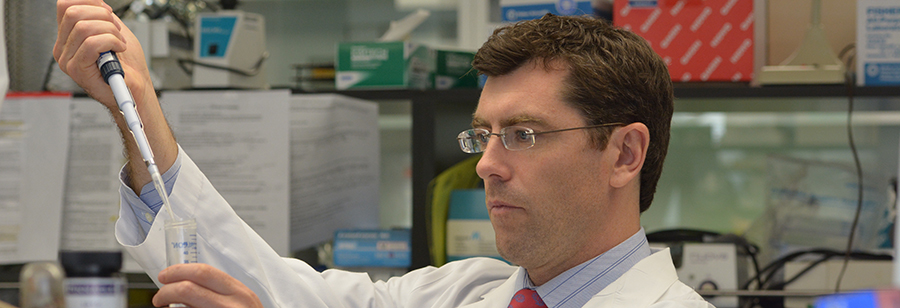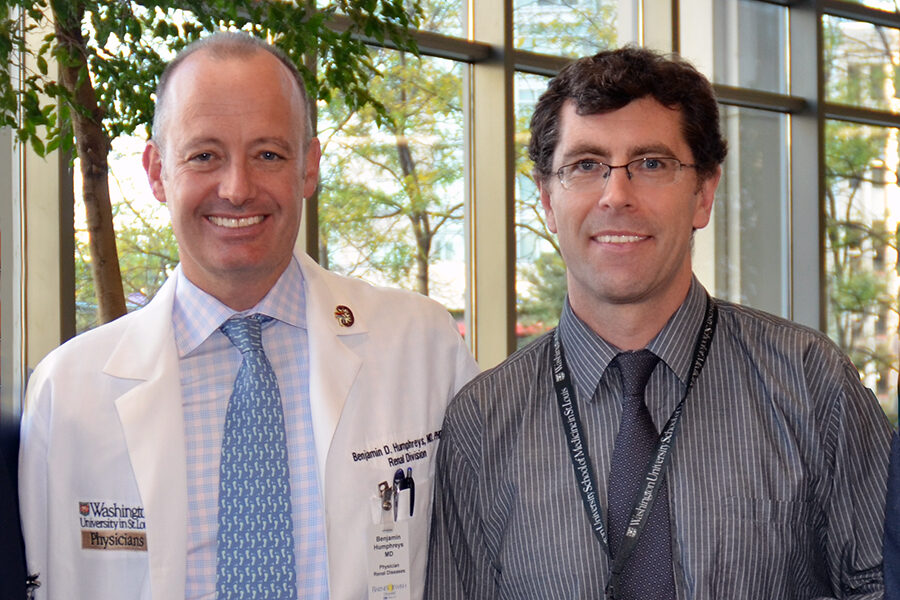
Dr. Andrew Malone
Congratulations to Assistant Professor of Medicine Andrew Malone, MB, BCh, who has been awarded an NIH Mentored Clinical Scientist Research Career Development grant (K08) to study the use of genomic technologies to improve understanding antibody mediated rejection in kidney transplantation.
K08 grants are awarded to individuals with a clinical doctoral degree to facilitate their transition in becoming an independent research investigator. Benjamin Humphreys, MD, PhD, Chief, Division of Nephrology, is Dr. Malone’s mentor.
The five-year grant awarded to Malone will provide support ($822,279) for his project titled Single Cell Analysis of Kidney Transplant Antibody Mediated Rejection.
Although kidney transplantation offers the greatest survival benefit for patients with end stage kidney disease and is more cost effective than dialysis, long-term outcomes for kidney transplantation have not significantly improved in recent decades. In fact, the number of patients with failed transplants returning to dialysis has more than doubled.

Dr. Andrew Malone with mentor, Dr. Benjamin Humphreys
The most common cause of late kidney transplant loss is antibody-mediated rejection (AMR), but because the pathophysiology of AMR is poorly understood, it is not known how to optimally manage these patients.
Two key events associated with AMR are the binding of donor specific antibody (DSA) to transplanted endothelial cells (EC) and inflammatory cell activation in the allograft. Malone’s central hypothesis is that EC become activated by DSA and trigger an immune response that results in survival of deleterious intragraft antibody-secreting cells (ASC).
Currently, approaches to understand the biological mechanisms of AMR have focused on microarray technology to analyze the transcriptional profiles of homogenized biopsy tissue samples, which contain a wide variety of cell types. Examination of whole tissue does not allow for the unbiased identification of transcripts from individual cells.
Malone will use the cutting-edge technique of microfluidic droplet-based single cell RNA-sequencing (scRNA-seq), which is capable of examining the transcriptional profiles of individual cells. The technique will be used to determine whether distinct EC phenotypes occur in AMR and if intragraft ASC express survival factors.
The single-cell results will be used to mine archival bulk microarray datasets from AMR biopsies to determine cell types, states and proportions in order to develop diagnostic and prognostic prediction models.
“Single cell RNA-sequencing technology enables us to study individual cells from a sample,” says Malone. “This is a very powerful tool that will help uncover the mysteries of this difficult to treat disease.” The goal is to find markers of treatment outcome and allograft survival in AMR and to identify unique markers in AMR as potential druggable targets.
Follow Dr. Malone @AndrewFMalone and Dr. Humphreys @HumphreysLab and WU Division of Nephrology @WUNephrology on Twitter.